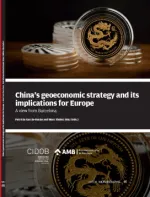China''s geoeconomic strategy and its implications for Europe. A view from Barcelona

CIDOB Monograph nº 85
China has become a key player on the global economic stage, including for local European economies like Barcelona’s. But its role in international trade causes tensions. The development model entailed by Chinese “state capitalism”, with its state-owned companies, subsidies and forced transfers of intellectual property, distorts the world economy. Meanwhile, the fall-outs between China and the United States only seem to increase, in what is already seen as a new episode of great power competition. The European Union, for its part, is busy redefining its strategy with China, following the failure of the investment agreement signed in 2020.
In this context, the chapters in this volume seek to grasp the central axes of Chinese economic policy, and its main effects on the rest of the world, focusing on the reaction of the European Union. The content is structured into two parts: the key elements of Chinese economic policy are examined first, and then potential European responses are presented.
Keywords: China, economic policy, effects, EU
D.L.: B 22913-2022 / ISBN: 978-84-18977-09-1